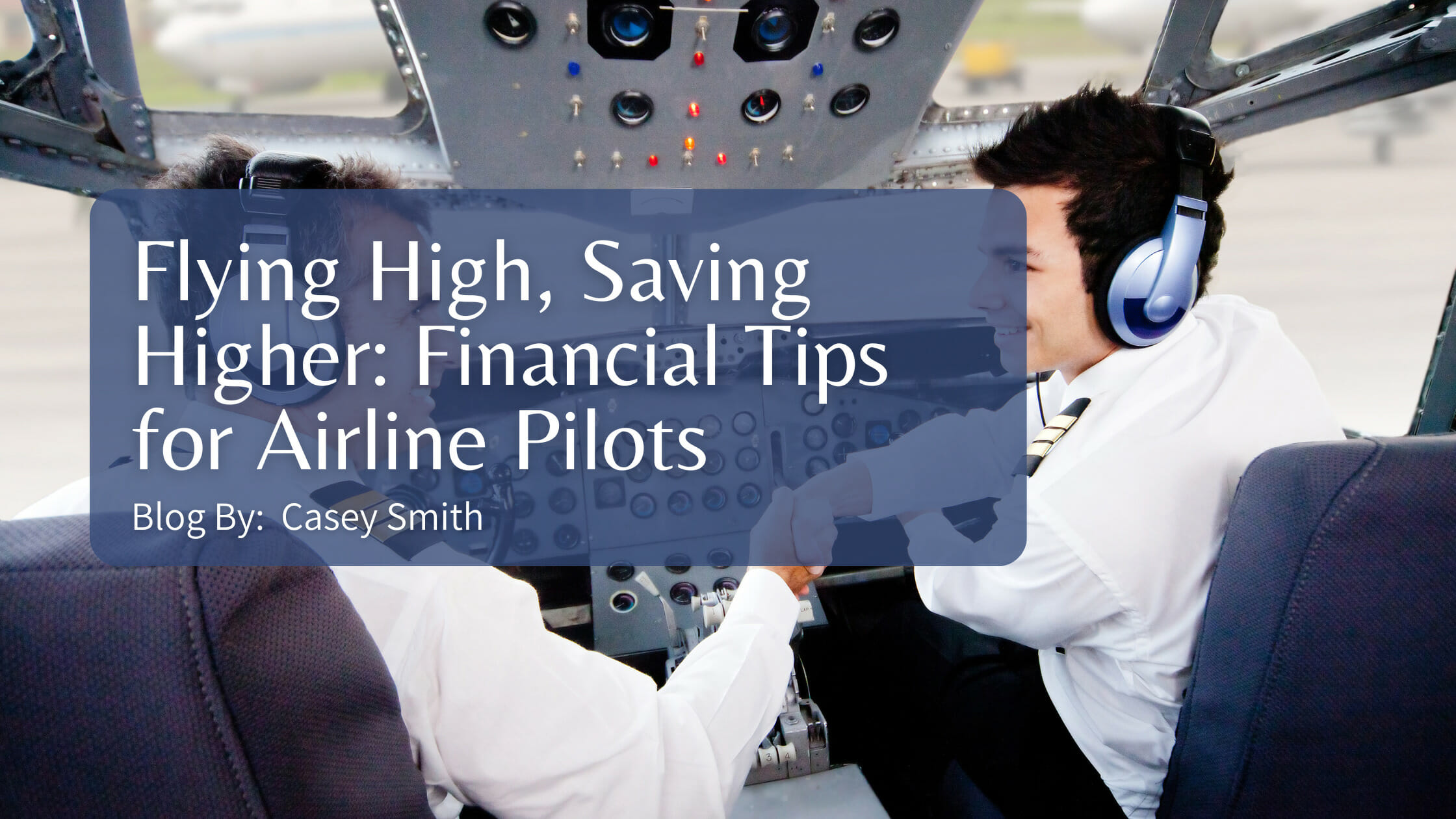Flying High, Saving Higher: Financial Tips for Airline Pilots

Being an airline pilot is an incredible profession that comes with unique opportunities and challenges. While you soar through the skies, it’s important to ensure your financial well-being is also soaring high. As a financial advisor and former pilot, I understand the financial complexities that pilots face. Here are some valuable financial tips for airline pilots that can help you make the most of your earnings and secure a stable financial future.
Create a Comprehensive Budget
Developing a budget is the foundation of any solid financial plan. Start by tracking your income and expenses meticulously. Categorize your spending into essentials (housing, transportation, food) and discretionary items (entertainment, travel). Having a clear understanding of where your money goes will help you identify areas where you can save and optimize your spending.
Build an Emergency Fund
Like anyone else, pilots should have an emergency fund to cover unexpected expenses or income disruptions. Aim to save at least three to six months’ worth of living expenses in a separate account. This fund will provide you with peace of mind and a financial safety net during challenging times.
Understand Your Benefits Package
Airline pilots often have access to a range of employee benefits. Take the time to understand the details of your benefits package, including retirement plans, healthcare, life insurance, and any other perks offered by your employer. Make sure you maximize these benefits to optimize your financial situation.
Retirement Planning
As a pilot, retirement planning is crucial due to the nature of the profession, which often involves mandatory retirement at age 65. Start contributing to your retirement accounts as early as possible. Take advantage of any employer-matching, 401k contributions and other unique airline retirement benefits to accelerate your retirement savings. Seek advice from a qualified financial advisor to help determine the best retirement strategy for your specific circumstances.
Manage Debt Effectively
Pilots often accumulate significant debt while undergoing training and education. It’s essential to manage this debt wisely. Prioritize paying off high-interest debts, such as credit cards or personal loans. Create a repayment plan to reduce your debt load systematically. Avoid unnecessary borrowing and live within your means to maintain a healthy financial profile.
Diversify Your Investments
While your primary source of income may be your pilot salary, it’s important to diversify your investments to build long-term wealth. Consider investment options such as stocks, bonds and real estate. Diversification can help protect your portfolio against market volatility and increase your chances of earning higher returns over time. Consult with a financial advisor to create an investment plan tailored to your goals and risk tolerance.
Insurance Coverage
As a pilot, you may have unique insurance needs due to the nature of your profession. Ensure you have adequate life insurance and disability coverage to protect yourself and your loved ones in case of an unforeseen event. Review your insurance policies regularly to make sure they align with your changing circumstances.
Tax Planning
Pilots often face complex tax situations due to earning income in multiple jurisdictions or through various channels. Work with a knowledgeable tax professional who understands the aviation industry to optimize your tax planning. They can help you navigate tax deductions, credits, and any other tax advantages available to pilots.
Flying high as an airline pilot is undoubtedly an exciting journey, but securing your financial future is equally important. By following these financial tips for airline pilots, you can lay the groundwork for a strong financial foundation. Remember, every successful flight requires careful planning, and the same holds true for your finances. Seek professional guidance, stay disciplined, and enjoy the rewards of your hard work both in the sky and in your financial life.
Have more questions? Contact Us
Casey Smith
President, Wiser Wealth Management
You May Also Like
Share This Story, Choose Your Platform!
Wiser Wealth Management, Inc (“Wiser Wealth”) is a registered investment adviser with the U.S. Securities and Exchange Commission (SEC). As a registered investment adviser, Wiser Wealth and its employees are subject to various rules, filings, and requirements. You can visit the SEC’s website here to obtain further information on our firm or investment adviser’s registration.
Wiser Wealth’s website provides general information regarding our business along with access to additional investment related information, various financial calculators, and external / third party links. Material presented on this website is believed to be from reliable sources and is meant for informational purposes only. Wiser Wealth does not endorse or accept responsibility for the content of any third-party website and is not affiliated with any third-party website or social media page. Wiser Wealth does not expressly or implicitly adopt or endorse any of the expressions, opinions or content posted by third party websites or on social media pages. While Wiser Wealth uses reasonable efforts to obtain information from sources it believes to be reliable, we make no representation that the information or opinions contained in our publications are accurate, reliable, or complete.
To the extent that you utilize any financial calculators or links in our website, you acknowledge and understand that the information provided to you should not be construed as personal investment advice from Wiser Wealth or any of its investment professionals. Advice provided by Wiser Wealth is given only within the context of our contractual agreement with the client. Wiser Wealth does not offer legal, accounting or tax advice. Consult your own attorney, accountant, and other professionals for these services.



